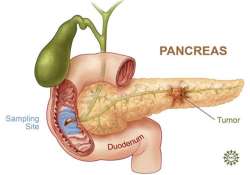Pancreatic cancer: many diseases rolled into one
Sydney, Oct 28: Pancreatic cancer, which tops mortality rates of all cancers, with Apple's founder Steve Jobs being its most famous victim, is many diseases rolled into one, says new research.A large-scale analysis done by

Sydney, Oct 28: Pancreatic cancer, which tops mortality rates of all cancers, with Apple's founder Steve Jobs being its most famous victim, is many diseases rolled into one, says new research.
A large-scale analysis done by the Institute for Molecular Bioscience (IMB), University of Queensland, defines the complexity of underlying mutations responsible for pancreatic cancers in more than 100 patients.
The analysis, Australia's contribution to the International Cancer Genome Consortium (ICGC), brings together the world's leading scientists to identify the genetic drivers behind 50 different cancer types, the journal Naturetoday reported.
“We found over 2,000 mutated genes in total, ranging from the KRAS gene, which was mutated in about 90 percent of samples, to hundreds of gene mutations that were only present in one or two percent of tumours,” said professor at the IMB, Sean Grimmond, according to an IMB statement.
“So while tumours may look very similar under the microscope, genetic analysis reveals as many variations in each tumour as there are patients,” Grimmond said.
“This demonstrates that so-called ‘pancreatic cancer' is not one disease, but many, and suggests that people who seemingly have the same cancer might need to be treated quite differently.”
Pancreatic cancer is one of the few for which survival has not improved substantially over the past 40 years.
Andrew Biankin, professor at Garvan Institute of Medical Research, along with Grimmond, led an international team of more than 100 researchers who sequenced the genomes of 100 pancreatic tumours and compared them to normal tissue to determine the genetic changes that lead to this cancer.
“In this study, we found a set of genes, the axon guidance pathway, that is frequently damaged in pancreatic cancer patients and is associated with a potentially poorer outcome for those patients.
It is a new marker of pancreatic cancer that can be used to direct prognoses and treatments,” said Biankin.
“'Personalised medicine', where the molecular profile of a patient is matched to the best treatment, is the way the world is moving for many diseases, not just cancer.”
“The challenge now will be in moving from population healthcare and a ‘one drug fits all' model to personalised healthcare.
“First we must take the time to develop the necessary genetic knowledge and implement health systems to translate that knowledge effectively,” added Biankin.
Biankin and Grimmond acknowledged the vital assistance of the Australian Pancreatic Cancer Genome Initiative, a network of more than 20 hospitals and research institutions Australia-wide, with over 200 members - surgeons, pathologists, nurses and researchers - that all contributed to the project.
A large-scale analysis done by the Institute for Molecular Bioscience (IMB), University of Queensland, defines the complexity of underlying mutations responsible for pancreatic cancers in more than 100 patients.
The analysis, Australia's contribution to the International Cancer Genome Consortium (ICGC), brings together the world's leading scientists to identify the genetic drivers behind 50 different cancer types, the journal Naturetoday reported.
“We found over 2,000 mutated genes in total, ranging from the KRAS gene, which was mutated in about 90 percent of samples, to hundreds of gene mutations that were only present in one or two percent of tumours,” said professor at the IMB, Sean Grimmond, according to an IMB statement.
“So while tumours may look very similar under the microscope, genetic analysis reveals as many variations in each tumour as there are patients,” Grimmond said.
“This demonstrates that so-called ‘pancreatic cancer' is not one disease, but many, and suggests that people who seemingly have the same cancer might need to be treated quite differently.”
Pancreatic cancer is one of the few for which survival has not improved substantially over the past 40 years.
Andrew Biankin, professor at Garvan Institute of Medical Research, along with Grimmond, led an international team of more than 100 researchers who sequenced the genomes of 100 pancreatic tumours and compared them to normal tissue to determine the genetic changes that lead to this cancer.
“In this study, we found a set of genes, the axon guidance pathway, that is frequently damaged in pancreatic cancer patients and is associated with a potentially poorer outcome for those patients.
It is a new marker of pancreatic cancer that can be used to direct prognoses and treatments,” said Biankin.
“'Personalised medicine', where the molecular profile of a patient is matched to the best treatment, is the way the world is moving for many diseases, not just cancer.”
“The challenge now will be in moving from population healthcare and a ‘one drug fits all' model to personalised healthcare.
“First we must take the time to develop the necessary genetic knowledge and implement health systems to translate that knowledge effectively,” added Biankin.
Biankin and Grimmond acknowledged the vital assistance of the Australian Pancreatic Cancer Genome Initiative, a network of more than 20 hospitals and research institutions Australia-wide, with over 200 members - surgeons, pathologists, nurses and researchers - that all contributed to the project.